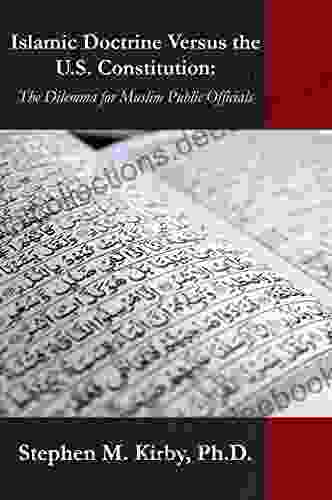Islamic Doctrine Versus The Constitution: A Comprehensive Analysis of Compatibility and Conflict

The relationship between Islamic doctrine and the United States Constitution is a complex and multifaceted issue that has been the subject of much debate and discussion. On the one hand, some argue that Islamic law is incompatible with the secular principles of the Constitution. On the other hand, others maintain that there is no inherent conflict between the two systems and that Muslims can be both devout and loyal citizens of the United States.
In this article, we will explore the historical context of this issue, examine the legal implications of Islamic law in the United States, and discuss some of the philosophical debates surrounding the compatibility of Islamic doctrine with the Constitution.
4.4 out of 5
| Language | : | English |
| File size | : | 2016 KB |
| Text-to-Speech | : | Enabled |
| Screen Reader | : | Supported |
| Enhanced typesetting | : | Enabled |
| Word Wise | : | Enabled |
| Print length | : | 223 pages |
| Lending | : | Enabled |
| X-Ray for textbooks | : | Enabled |
Historical Context
The question of whether Islamic law is compatible with the Constitution has been raised since the founding of the United States. In 1787, James Madison, who would later become the fourth President of the United States, wrote in The Federalist Papers that "the people of the United States are a religious people, and their institutions presuppose a future state." However, he also warned that "no religious test shall ever be required as a qualification to any office or public trust under the United States."
The First Amendment to the Constitution, which was adopted in 1791, enshrines the principle of religious freedom. It states that "Congress shall make no law respecting an establishment of religion, or prohibiting the free exercise thereof." This amendment has been interpreted by the Supreme Court to mean that the government cannot favor one religion over another and that individuals are free to practice their own religion without government interference.
However, the issue of Islamic law in the United States has become more prominent in recent years, due in part to the growing number of Muslim immigrants in the country. According to the Pew Research Center, there were an estimated 3.45 million Muslims living in the United States in 2017, up from 2.75 million in 2010. As the Muslim population in the United States continues to grow, so too will the debate over the compatibility of Islamic law with the Constitution.
Legal Implications
The legal implications of Islamic law in the United States are complex and uncertain. There is no clear consensus on whether Islamic law is compatible with the Constitution, and the courts have not yet definitively ruled on this issue.
One of the main legal issues surrounding Islamic law is the question of whether it can be used to justify discrimination against women. Islamic law allows for certain forms of discrimination against women, such as polygamy and the requirement that women cover their hair and bodies. However, the Supreme Court has ruled that gender discrimination is unconstitutional, and it is unclear whether Islamic law can be used to justify practices that discriminate against women.
Another legal issue surrounding Islamic law is the question of whether it can be used to justify violence. Islamic law allows for the use of violence in certain circumstances, such as self-defense and the defense of one's property. However, the Supreme Court has ruled that the use of violence is only justified in very limited circumstances, and it is unclear whether Islamic law can be used to justify violence that would be considered illegal under the Constitution.
The legal implications of Islamic law in the United States are still being debated, and it is likely that the courts will continue to play a major role in shaping the law in this area.
Philosophical Debates
In addition to the legal implications, there are also a number of philosophical debates surrounding the compatibility of Islamic doctrine with the Constitution. One of the main philosophical debates is the question of whether Islamic law is compatible with the principle of religious freedom.
Some argue that Islamic law is incompatible with religious freedom because it requires Muslims to follow a specific set of religious beliefs and practices. They argue that this violates the principle of religious freedom, which allows individuals to choose their own religion and practice it without government interference.
Others argue that Islamic law is compatible with religious freedom because it allows Muslims to practice their religion freely. They argue that the fact that Islamic law requires Muslims to follow a specific set of religious beliefs and practices does not mean that it violates the principle of religious freedom, as long as Muslims are free to choose whether or not to follow Islamic law.
Another philosophical debate surrounding the compatibility of Islamic doctrine with the Constitution is the question of whether Islamic law is compatible with the principle of equality. Some argue that Islamic law is incompatible with the principle of equality because it allows for certain forms of discrimination against women and non-Muslims.
Others argue that Islamic law is compatible with the principle of equality because it requires Muslims to treat all people with respect, regardless of their gender or religion. They argue that the fact that Islamic law allows for certain forms of discrimination against women and non-Muslims does not mean that it violates the principle of equality, as long as Muslims are free to choose whether or not to follow Islamic law.
The philosophical debates surrounding the compatibility of Islamic doctrine with the Constitution are complex and nuanced. There is no easy answer to the question of whether or not the two systems are compatible.
The relationship between Islamic doctrine and the United States Constitution is a complex and multifaceted issue that has been the subject of much debate and discussion. There is no clear consensus on whether or not the two systems are compatible, and the courts have not yet definitively ruled on this issue.
However, the debate over the compatibility of Islamic doctrine with the Constitution is likely to continue for many years to come. As the Muslim population in the United States continues to grow, so too will the need for a clear understanding of the relationship between the two systems.
4.4 out of 5
| Language | : | English |
| File size | : | 2016 KB |
| Text-to-Speech | : | Enabled |
| Screen Reader | : | Supported |
| Enhanced typesetting | : | Enabled |
| Word Wise | : | Enabled |
| Print length | : | 223 pages |
| Lending | : | Enabled |
| X-Ray for textbooks | : | Enabled |
Do you want to contribute by writing guest posts on this blog?
Please contact us and send us a resume of previous articles that you have written.
 Book
Book Chapter
Chapter Story
Story Genre
Genre Library
Library Paperback
Paperback E-book
E-book Newspaper
Newspaper Sentence
Sentence Shelf
Shelf Preface
Preface Annotation
Annotation Footnote
Footnote Manuscript
Manuscript Tome
Tome Classics
Classics Library card
Library card Biography
Biography Memoir
Memoir Dictionary
Dictionary Thesaurus
Thesaurus Narrator
Narrator Resolution
Resolution Card Catalog
Card Catalog Borrowing
Borrowing Archives
Archives Study
Study Research
Research Scholarly
Scholarly Lending
Lending Reserve
Reserve Academic
Academic Rare Books
Rare Books Interlibrary
Interlibrary Study Group
Study Group Dissertation
Dissertation Storytelling
Storytelling Reading List
Reading List Book Club
Book Club Theory
Theory Gina Ochsner
Gina Ochsner Steve Cairney
Steve Cairney Suzanne Sosna Levine
Suzanne Sosna Levine Nicoletta Arbia
Nicoletta Arbia Roberto Galli
Roberto Galli Tarek El Ariss
Tarek El Ariss Craig Johnson
Craig Johnson Matt C Bischoff
Matt C Bischoff Spencer Earl Watts
Spencer Earl Watts Alyce Mahon
Alyce Mahon Sasha Davis
Sasha Davis Janice Gunstone
Janice Gunstone Heather Vogel Frederick
Heather Vogel Frederick Marc Cranswick
Marc Cranswick James Buice
James Buice Bill Gardner
Bill Gardner Dan Slater
Dan Slater Cindy Krum
Cindy Krum Emanuel Deutschmann
Emanuel Deutschmann Pat Laprade
Pat Laprade
Light bulbAdvertise smarter! Our strategic ad space ensures maximum exposure. Reserve your spot today!

 Peter CarterJourney Through a Tapestry of Adventure: Delving into the World of "Across a...
Peter CarterJourney Through a Tapestry of Adventure: Delving into the World of "Across a...
 Miguel de CervantesEmbark on a Crocheting Adventure: Master the Art of Tractor Appliqué with...
Miguel de CervantesEmbark on a Crocheting Adventure: Master the Art of Tractor Appliqué with...
 William ShakespeareEat Like a Local in Sweden: The Ultimate Food Guide to Swedish Cuisine
William ShakespeareEat Like a Local in Sweden: The Ultimate Food Guide to Swedish Cuisine
 Jaylen MitchellMighty Fortress Hymns Of The West: A Collection of 60 German Hymns Translated...
Jaylen MitchellMighty Fortress Hymns Of The West: A Collection of 60 German Hymns Translated... Patrick HayesFollow ·13.4k
Patrick HayesFollow ·13.4k Bradley DixonFollow ·8.8k
Bradley DixonFollow ·8.8k Joseph FosterFollow ·6.8k
Joseph FosterFollow ·6.8k Dustin RichardsonFollow ·4.5k
Dustin RichardsonFollow ·4.5k Paul ReedFollow ·18.3k
Paul ReedFollow ·18.3k Juan RulfoFollow ·13.8k
Juan RulfoFollow ·13.8k Robin PowellFollow ·8.5k
Robin PowellFollow ·8.5k John ParkerFollow ·4.8k
John ParkerFollow ·4.8k

 Andy Hayes
Andy HayesEmbracing Now: Embark on a Mindfulness Journey for a...
In a world...

 Heath Powell
Heath Powell100 Hymns for Violin and Guitar: A Comprehensive Guide to...
The violin and...

 Floyd Richardson
Floyd RichardsonBark In The Park: Poems For Dog Lovers
Dogs are our best...

 Douglas Adams
Douglas AdamsThe Barter Crusade: A Journey into the Realm of Exchange...
In a world driven by monetary transactions,...

 Nathaniel Hawthorne
Nathaniel HawthorneInsight Guides Explore Nice & the French Riviera...
Prepare to embark on an unforgettable journey...

 Carlos Fuentes
Carlos FuentesThe Ultimate Practical Guide to Percussion: Exploring the...
Embark on a journey into the enchanting...
4.4 out of 5
| Language | : | English |
| File size | : | 2016 KB |
| Text-to-Speech | : | Enabled |
| Screen Reader | : | Supported |
| Enhanced typesetting | : | Enabled |
| Word Wise | : | Enabled |
| Print length | : | 223 pages |
| Lending | : | Enabled |
| X-Ray for textbooks | : | Enabled |




